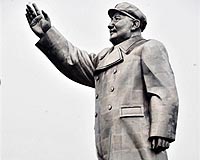 |
Hong Kong (AFP) July 2, 2009 A high-profile court battle over the huge estate of late Hong Kong tycoon Nina Wang has lifted the lid on the city's obsession with the ancient Chinese energy system of feng shui. From burning money to digging feng shui holes, the case has highlighted the superstitions many in the city are drawn to as they search for success, wealth and happiness. And while the system is often seen in the West as simply a quirky way of arranging furniture, it is taken very seriously here. At the centre of the High Court case is so-called feng shui master Tony Chan, a former bartender whose permanent grin has filled the city's newspapers for weeks. Chan, who says he was Wang's lover as well as her feng shui adviser, is laying claim to the eccentric tycoon's 13 billion US dollar fortune. Chinachem Charitable Foundation, controlled by Wang's siblings, says the will giving Chan the money is a fake. Lawyers for Chinachem argued Chan took advantage of Wang's declining health and seduced her with promises he could use feng shui to get rid of the cancer that would kill her in 2007. They also claimed that Chan had told Wang he could help bring back her kidnapped husband, Teddy, by digging holes on the grounds of her properties and filling them with engraved jade pieces. Her husband has never been found since he was kidnapped for a second time in 1990. He was declared legally dead nine years later. During his week-long stint on the stand, Chan's credentials have been undermined. As a result, the entire practice of feng shui is in the dock. Lee Sing-tong, a veteran master, said the profession should be regulated to prevent people such as Chan from ruining reputations. "Chan has destroyed the trust that clients place in us," Lee told AFP. Chan was able to convince high-powered clients, including politicians and businessmen, to pay him huge sums for advice. Wang herself gave him three tranches of 688 million Hong Kong dollars (88.2 million US) shortly before she died. Chan has been pummelled on the stand, conceding that he did not know how to perform some feng shui rituals properly. His advice to clients to burn banknotes to improve their luck originated from his late father -- a retired schoolteacher who, he said, could have given him the idea as a joke. Feng shui -- literally "wind-water" -- is the art of improving the quality of someone's life by enhancing their environment according to the principles of harmony and energy flow. It says that everything in the universe is composed of two opposite yet complementary qualities: yin, which symbolises the passive side of nature, and yang, which represents the active side. It also incorporates five elements or forms of energy: wood, fire, earth, metal and water. The idea is to achieve a balance of these elements. Peter So, one of the city's most prominent masters, said it was a scientific discipline. "Feng shui is very straightforward. It has nothing to do with magic or religion," he told AFP. "Everything is about calculations and the interaction between people and their environment. Anything on top of that are gimmicks created by the so-called masters to increase their appeal to the clients." The case has also highlighted Hong Kong's fascination with good luck -- lucky phone numbers are much coveted here and few buildings have a fourth floor as the Chinese word "four" sounds like the word for "death." The Bank of China tower, designed by American-Chinese architect I.M. Pei, caused huge controversy when it became part of Hong Kong's famous skyline in the 1990s as its sharp triangular design was said to exert bad feng shui on surrounding buildings. There was even a suggestion that the design was chosen deliberately to channel bad energy towards the then-British governor's residence. Disney employed a feng shui consultant when it built its theme park in the city -- it has since been plagued by bad luck -- and many residents would not dream of moving into a new flat before they had called in an expert. As a result, the field is lucrative. A consultant can charge several thousand Hong Kong dollars to look at a typical 500-square-foot flat, with the best-known masters charging much more. Antony Hindmarsh, of Qi Homes Property Consultants, which offers feng shui advice, said the practice was spreading beyond Chinese people and one Western client had recently sought advice after a "string of bad luck." "More and more Westerners are embracing it. It's definitely gaining popularity," he said. Share This Article With Planet Earth
Related Links China News from SinoDaily.com
 Tight security ahead of China's 60th anniversary
Tight security ahead of China's 60th anniversaryBeijing (AFP) July 2, 2009 Three months before the 60th anniversary of the founding of communist China, tensions are simmering, as Beijing has mobilised its huge security and propaganda apparatus to nip trouble in the bud. Mao Zedong appeared triumphantly in front of a crowd of 100,000 in Tiananmen Square on October 1, 1949, proclaiming victory over the Nationalist enemy. Six decades on, observers say the ... read more |
|
| The content herein, unless otherwise known to be public domain, are Copyright 1995-2009 - SpaceDaily. AFP and UPI Wire Stories are copyright Agence France-Presse and United Press International. ESA Portal Reports are copyright European Space Agency. All NASA sourced material is public domain. Additional copyrights may apply in whole or part to other bona fide parties. Advertising does not imply endorsement,agreement or approval of any opinions, statements or information provided by SpaceDaily on any Web page published or hosted by SpaceDaily. Privacy Statement |